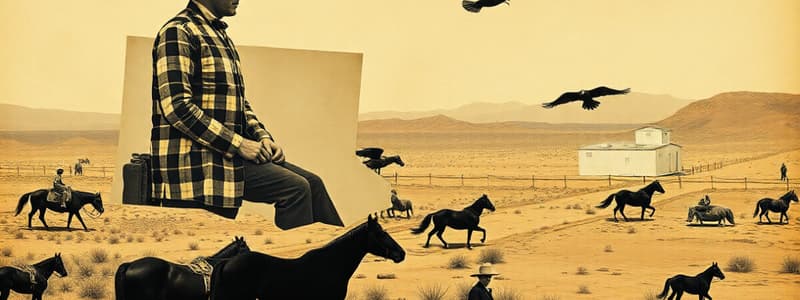Podcast
Questions and Answers
What primarily contributed to the growth of the plantation system in the southern United States?
What primarily contributed to the growth of the plantation system in the southern United States?
- Cultural influences
- Political decisions
- Geographic factors (correct)
- Industrial advancements
Uncle Tom’s Cabin was a book that supported slavery and was written by Harriet Beecher Stowe.
Uncle Tom’s Cabin was a book that supported slavery and was written by Harriet Beecher Stowe.
False (B)
What secret network helped enslaved Africans escape to free states?
What secret network helped enslaved Africans escape to free states?
The Underground Railroad
Bleeding Kansas refers to the violent clashes between __________ and anti-slavery groups.
Bleeding Kansas refers to the violent clashes between __________ and anti-slavery groups.
Match the following individuals/terms with their significance:
Match the following individuals/terms with their significance:
Which of the following acts promoted development of western lands by providing free land to settlers?
Which of the following acts promoted development of western lands by providing free land to settlers?
The idea of 'Manifest Destiny' supported the notion of expanding the US territory to both the Pacific Ocean and lands claimed by other nations.
The idea of 'Manifest Destiny' supported the notion of expanding the US territory to both the Pacific Ocean and lands claimed by other nations.
What was the primary purpose of the Kansas-Nebraska Act of 1854?
What was the primary purpose of the Kansas-Nebraska Act of 1854?
The __________ decision in 1857 ruled that Congress could not ban slavery in the territories.
The __________ decision in 1857 ruled that Congress could not ban slavery in the territories.
Match the following compromises with their key features:
Match the following compromises with their key features:
Flashcards
Southern Plantation System
Southern Plantation System
A system of large farms in the Southern US that relied heavily on enslaved labor for cotton production.
Cotton Production Growth
Cotton Production Growth
Increased cotton production in the South due to new inventions in the 1800s.
Bleeding Kansas
Bleeding Kansas
A period of violence in Kansas between proslavery and antislavery groups.
Uncle Tom's Cabin
Uncle Tom's Cabin
Signup and view all the flashcards
Underground Railroad
Underground Railroad
Signup and view all the flashcards
Westward Expansion
Westward Expansion
Signup and view all the flashcards
Homestead Act (1862)
Homestead Act (1862)
Signup and view all the flashcards
Popular Sovereignty
Popular Sovereignty
Signup and view all the flashcards
Missouri Compromise (1820)
Missouri Compromise (1820)
Signup and view all the flashcards
Kansas-Nebraska Act (1854)
Kansas-Nebraska Act (1854)
Signup and view all the flashcards
Study Notes
Westward Expansion
- Gold Rush (1849): Triggered massive westward migration, significantly boosting California and western territory populations.
- Homestead Act (1862): Offered free land to settlers, demonstrating federal support for western settlement, mainly impacting the Great Plains.
- Pacific Railway Act (1862): Encouraged transcontinental railroad construction via land grants to railroad companies in the latter half of the 1800s.
- Manifest Destiny: The belief that the US should control the entire continent, leading to westward expansion to the Pacific, the annexation of Texas, and the Mexican-American War. This ideology was contested by abolitionists concerned about new slave states.
- Abolitionist Movement: Advocated for the end of slavery, led by figures like William Lloyd Garrison, Harriet Tubman, and Harriet Beecher Stowe.
- Slavery Tensions: Westward expansion amplified tensions over slavery's role in new territories. Should these lands be free or slave?
Compromises & Legislation
- Missouri Compromise (1820): Admitted Missouri as a slave state and Maine as a free state, aiming for congressional balance.
- Compromise of 1850: A series of laws attempting to address slavery in newly acquired territories after the Mexican-American War.
- Kansas-Nebraska Act (1854): Created Kansas and Nebraska territories, allowing residents to decide the issue of slavery through popular sovereignty.
- Popular Sovereignty: The principle that settlers get to determine whether their territory allows slavery.
- Dred Scott v. Sandford (1857): Supreme Court ruling that Congress couldn't prohibit slavery in the territories.
- Bleeding Kansas: Violent conflicts between pro-slavery and anti-slavery settlers in Kansas.
- "Uncle Tom's Cabin": Harriet Beecher Stowe’s influential book depicting the cruelty of slavery, contributing to the growing opposition in the North.
- Underground Railroad: A network of secret routes and safe houses used by enslaved people to escape to free states.
Southern Context
- Plantations: Large agricultural farms in the South, relying heavily on enslaved labor. Southern reliance on plantations grew more prevalent due to geography.
- Cotton Production Growth: Increased due to technological advancements, driving the expansion of slavery in the South during the first half of the 1800s.
Studying That Suits You
Use AI to generate personalized quizzes and flashcards to suit your learning preferences.




